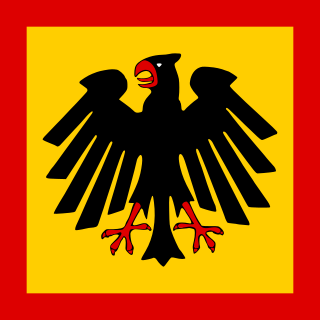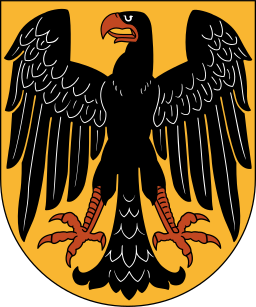
The Bundestag is the German federal parliament. It can be compared to the chamber of deputies along the lines of the United States House of Representatives or the House of Commons of the United Kingdom. Through the Bundesrat, a separate institution, the individual states of Germany participate in legislation similar to a second house in a bicameral parliament.

The Reichstag fire was an arson attack on the Reichstag building, home of the German parliament in Berlin, on Monday 27 February 1933, precisely four weeks after Adolf Hitler was sworn in as Chancellor of Germany. Hitler's government stated that Marinus van der Lubbe, a Dutch council communist, was found near the building, and they attributed the fire to communist agitators in general—though a German court decided later that year that van der Lubbe had acted alone, as he claimed. After the fire, the Reichstag Fire Decree was passed. The Nazi Party used the fire as a pretext that communists were plotting against the German government, and the event is considered pivotal in the establishment of Nazi Germany. The term "Reichstag fire" has come to refer to false flag actions facilitated by an authority to promote their own interests through popular approval of retribution or retraction of civil rights.

The Enabling Act of 1933, formally titled Gesetz zur Behebung der Not von Volk und Reich, was an amendment passed on 23 March 1933 to the Weimar Constitution that gave the German Cabinet — in effect, Chancellor Adolf Hitler — the power to enact laws without the involvement of the Reichstag. The Enabling Act gave Hitler plenary powers and followed on the heels of the Reichstag Fire Decree, which had abolished most civil liberties and transferred state powers to the Reich government. The combined effect of the two laws was to transform Hitler's government into a legal dictatorship.

The German Bundesrat is a legislative body that represents the sixteen Länder of Germany at the national level. The Bundesrat meets at the former Prussian House of Lords in Berlin. Its second seat is located in the former West German capital of Bonn.

The Reichspräsident was the German head of state under the Weimar constitution, which was officially in force from 1919 to 1945. In English he was usually simply referred to as the President of Germany. The German title Reichspräsident literally means President of the Reich, the term Reich referring to the federal nation state established in 1871.

The Reichsrat was one of two legislative bodies in Germany during Weimar Republic (1919–1933), the other being the Reichstag.

The Constitution of the German Empire was the basic law of the German Empire of 1871-1918, from 16 April 1871, coming into effect on 4 May 1871. German historians often refer to it as Bismarck's imperial constitution, in German the Bismarcksche Reichsverfassung (BRV).

Federal elections were held in Germany on 5 March 1933, after the Nazi seizure of power on 30 January and just six days after the Reichstag fire. Nazi stormtroopers had unleashed a widespread campaign of violence against the Communist Party (KPD), left-wingers, trade unionists, the Social Democratic Party of Germany, and the Centre Party. They were the last multi-party elections in a unified Germany until 1990.
The German Progress Party was the first modern political party in Germany, founded by liberal members of the Prussian House of Representatives in 1861 in opposition to Minister President Otto von Bismarck.

Wilhelm Hasenclever was a German politician. He was an originally a tanner by trade but later he became a journalist and author. However, he is most well known for his political work in the predecessors of the Social Democratic Party of Germany (SPD).

The title Chancellor has designated different offices in the history of Germany. It is currently used for the Chancellor of the Federal Republic of Germany, the head of government of Germany.

Albert Hänel was a German jurist, legal historian and liberal politician. He was one of the leaders of the German Progress Party, and served as Rector of the University of Kiel. He served as a member of the Prussian Chamber of Deputies, the Reichstag of the North German Confederation and the Imperial Reichstag, and was Vice President of both the Prussian Chamber of Deputies and the Imperial Reichstag.

The Reichstag was the Parliament of Germany from 1871 to 1918. Legislation was shared between the Reichstag and the Bundesrat, which was the Imperial Council of the reigning princes of the German States.

The Reichstag was the Lower house of the Weimar Republic's Legislature. It originated in the creation of the Weimar Constitution in 1919. After the end of the Weimar Republic in 1933, the Reichstag continued to operate, albeit sporadically, as the nominal Legislature of Nazi Germany.

The Reichstag, officially the Großdeutscher Reichstag after 1938, was the pseudo-Parliament of the Third Reich from 1933 to 1945. Following the Nazi seizure of power and the passing of the Enabling Act of 1933, it met only as a rubber stamp for the actions of Adolf Hitler's dictatorship — always by unanimous consent — and to listen to Hitler's speeches. In this purely ceremonial role, the Reichstag convened only 20 times, the last on 26 April 1942. The President of the Reichstag throughout this period was Hermann Göring.

Elections to the Constituent Reichstag of the North German Confederation were held on 12 February 1867, with run-off elections during the following weeks. The National Liberal Party emerged as the largest party, winning 80 seats and receiving strong support in Hanover, Kassel and Nassau. Voter turnout was around 65% in Prussian constituencies. After the Constituent Reichstag had drawn up and agreed a constitution, fresh elections were held in August.

Elections to the Zollparlament of the German Zollverein were held in February and March 1868. The Zollparlament consisted of the members of the Reichstag of the North German Confederation and members from the South German states. Those South German members were elected in these elections, the North Germans were the Reichstag members elected the previous year.





















